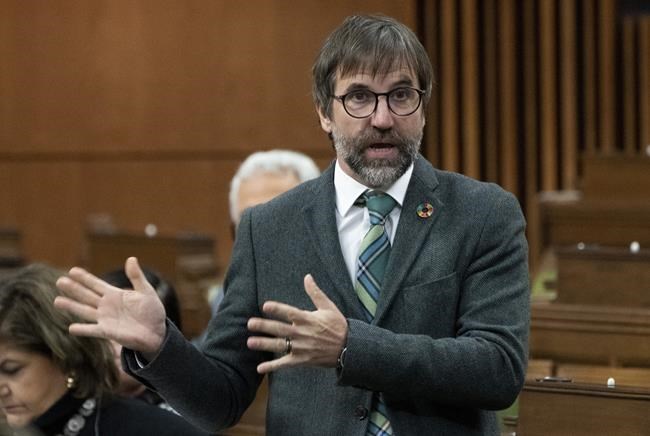OTTAWA — Oil and gas companies can show their commitment to climate action by investing some of their record profits to cut their emissions, Environment Minister Steven Guilbeault said Friday.
Canadian oil companies are reaping the benefits of surging oil prices following the Russian invasion of Ukraine with many companies posting record profits in the first half of 2022.
This week, UN Secretary-General António Guterres called on countries to impose windfall taxes on fossil fuel companies that are raking in cash while people are suffering from high inflation and "our planet burns."
Guilbeault says neither he nor the government is stoutly against windfall taxes that could redirect some of those profits to people or climate action.
At the moment, he says, carbon pricing and regulations to ratchet down emissions from the energy sector are ensuring the companies have to shoulder some of the burden.
But he says he's still waiting to see comprehensive plans from the sector.
"We are very eager to see companies' investment plans into decarbonization," Guilbeault said in an interview.
"If they don't make those investments while they're making record-level profits, then when would it be a good time for them to make those investments? If not now, then I don't know when."
The European Commission recently proposed a windfall tax along the lines of what Guterres wants. The United Kingdom imposed one over the summer, though new Prime Minister Liz Truss is not a fan and while she won't cancel the one brought in already, she won't extend it as some have requested.
Guilbeault said he wants "to make clear that I'm not against windfall taxes."
A surge in global oil prices following the Russian invasion in Ukraine sent oil company profits through the roof. In the first six months of this year, Canada's four biggest oilsands producers reported more than $21 billion in profits, more than three times their profits in the same period last year.
Kendall Dilling, president of the Pathways Alliance, said in a statement Friday that companies are committed and will invest but there are a number of federal policies still being finalized, such as an investment tax credit for carbon capture and storage projects.
The Pathways Alliance is an organization of Canada's six biggest oilsands producers charting a course toward net-zero emissions by 2050.
Dilling also said industry profits fluctuate, and in 2020 Pathways companies had negative profits.
Oil prices tanked in 2020 mainly because of the COVID-19 pandemic and plunging demand.
Dilling said the "projects and technologies to reduce emissions will be developed and financed over a period of 30 years, during which we will be subject to fluctuating commodity price cycles, such as these."
"We remain confident that continued collaboration with governments will enable a fiscal and policy framework that is required for our industry to proceed to final investment decisions," Dilling said.
NDP environment critic Laurel Collins called on the government Thursday to follow Guterres's call and impose a windfall tax.
Collins said "oil companies are making record profits" and the government should tax them to "help put more money back in people's pockets."
In response to Collins' question Thursday, Finance Minister Chrystia Freeland pointed to windfall taxes being imposed on banks and insurance companies for excess profits made during the pandemic.
She promised such a tax in this year's federal budget and draft legislation to create one was published in August. The Canada Recovery Dividend is proposed as a one-time 15 per cent tax on the average taxable income above $1 billion in 2020 and 2021.
The parliamentary budget officer estimated in a report Thursday that tax would raise about $3 billion.
Freeland is also proposing to permanently raise the corporate income tax rate for bank and insurance company profits above $100 million, a tax the PBO says would raise about $2.3 billion over the next five years.
This report by The Canadian Press was first published Sept. 23, 2022.
Mia Rabson, The Canadian Press



